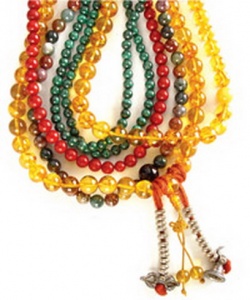Mala
mala (S): T. treng-wa. A string of beads for counting prayers and other spiritual practices. The ideal number of beads is said to be 108.
Buddhist mala are 108 beads strung together much like a rosary. These beads can be made of any kind of precious or semi-precious stones. Usually a mala comprises of 108 beads, so when you are asked to chant "one mala" of a certain Mantra, it means you chant it 108 times. The beads usually comprise two sets of 28 beads, with larger beads serving as dividers and this is for reciting the longer mantras 28 times.
The selection of mala beads is a very personal choice, although it is a good idea to have one made of semi- precious stones, since this is like Offering jewels to The Buddha each time you recite your mantras.
It is believed that the effects of mantras increase with repetition. It is also believed that the vibrations can be ‘stored’ in a mala. As with many spiritual practices, the general belief is that energy can be transferred from you to an object, transmuted within that object with the vibration of sound, and returned to you for healing and guidance. This is the principle belief behind the use of Malas.
A Mala consists of 108 or 54 beads strung together. All the beads are of the same size and weight except for one, the Meru (Sanskrit for: Mountain). Traditionally, a Mantra is repeated a minimum of 108 times. A mala helps keep count of the repetitions within a set of repetitions. 108: It is believed that there are 108 Nadis, or channels, which radiate out from the major Chakra system of our subtle body. This mirrors the system of veins, which move nutrients through out our physical body. As we chant each repetition of the mantra, the goal is to provide spiritual nourishment to each of these channels. TO HOLD THE POWER: There are strict guidelines on how to use a Mala. It should be held in the right hand.
The beds should be draped over your Middle, Ring and Baby fingers, which represent Positive, Negative and Neutral forces. The index finger remain extended and never comes in contact with the Mala, as it represents the ego. The Meru should be placed just sound of the thumb, the first bed resting on it. It is the thumb, which represents the Divine, which will move the mala around, till the meru is to its north, never cross the meru. If you are working with a 54 string mala, you simply reverse the direction of the movement.
CHOICE OF MALA
Popular choices in recent years are quartz crystals – both smooth and faceted, as well as colour-enhanced amber and red coral. Lapis, turquoise, amethyst and ametrine malas are also very popular. When you purchase a mala, select one you feel affinity with and then empower your mala with the Blessing Mantra given in this booklet.
MAKING YOUR MALA AUSPICIOUS dorje_bellIt is auspicious to attach the "Dorje" and "Bell" (made of silver) to your mala.
You can also attach Blessing threads given by high lamas and any one of the eight auspicious objects which are the mystic knot, the vase, the double fish, the banner of victory, the Wheel, the Lotus, the parasol and the right turning Conch shell.
It is advisable to keep your mala in a pouch preferably out of reach of other hands. You can wear it on your wrist. Always carry your mala with you wherever you go and especially when travelling. Chanting mantras is one of the most powerful ways to purify negative Karma that cause bad things to happen to us. In this sense, it is the most effective way of keeping us safe and protected as we go about our daily task of living. Let your mala be a source of Joy and loving Kindness for you and your loved ones. But remember that without recitations of mantras that empower it, the mala is just a string of beads.
It is your motivation that makes your mala unique for you.
